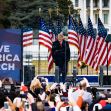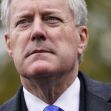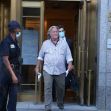The U.S. House’s January 6 Executive Select Committee on Tuesday voted 9 to 0 to recommend that Steve Bannon, a former close advisor to President Donald Trump, be charged with criminal contempt. Steven Bannon, facing a congressional subpoena, defied the order to cooperate.
This high-profile case raises a legal conundrum about the scope and limitations of presidential privilege as it pertains to any president’s legal right to keep official conversations secret, especially regarding private discussions.
However, Bannon was not acting in any official capacity during the January 6 deadly mob attack on Capitol Hill. This test of executive privilege is novel since Bannon had not been working in the executive branch since 2017, meaning any more recent conversations with then-President Trump were private ones.
Until now, there has never been a legal decision as to whether private conversations between the president and a citizen are covered by executive privilege. The Biden administration said it is not “in the public interest” to hide any secret plots to overturn the legal, orderly presidential transfer of power, and it has denied any elective privilege over any January 6 materials.
Bannon’s looming criminal contempt charges are expected to trigger a legal war that will pick apart the minutiae of executive privilege, especially when given by a US president. At issue are long-held beliefs that presidents can shield their former government advisors and even private citizens in respect to actions or conversations or advice in a non-official status.
On Thursday, the House is expected to vote on the criminal contempt resolution since Democrats hold a majority, and it is expected to pass. If passed, the Department of Justice (DOJ) will consider the contempt charges and decide whether to prosecute Bannon. If the expected referral to the DOJ occurs, Bill Miller, the spokesman for the US Attorney’s Office, said they would “evaluate the matter. Based on the facts and the law.”
In 2015, sharing the temperature of the DOJ’s views on executive privilege, the department said they would consider prosecuting cases such as Bannon’s that test the power of executive privilege.
Evidence from January 5, 2020, one day before the infamous January Capitol Hill attack by a violent Trump mob trying to overturn the legal election of President Joe Biden, Bannon told his public radio show audience that an “attack” was about to happen.
Bannon’s words clearly predict the next day’s attack, as he discussed Trump’s plans to try to overturn the legal election of new President Trump the very next day when congress would be assembling to officially formalize the election results.
On his radio show, Bannon said, “The point of attack is tomorrow. It’s going to kick off. It’s going to be very dramatic,” and “all hell is going to break loose tomorrow.”
The House Select Committee wants to interview Bannon as part of their investigation into the January 6 deadly attacks, since he seemed to be predicting the next day’s events.
But testing the limits of presidential privilege is a thorny endeavor. The DOJ will need to tackle the notion of a president's privilege to keep official versus private communications secret from the public.
Since Bannon’s information will not endanger national security, does not involve the current White House administration, and does not invoke any official conversations between a president and his staff, the legality of Bannon hiding behind executive privilege as a private citizen does not relate to any former person where privilege was invoked.
Simultaneously, Trump filed his own federal lawsuit to block the release of his presidential records. He is suing the head of the National Archives, who controls and protects presidential records, and the chairman of the investigative committee, Democrat Representative Bennie Thompson.
Thompson, in a statement, said Bannon must “comply with our investigation or he will face the consequences.”
Investigators said in their House Select committee report that Bannon seemed to have had “multiple roles relevant to this investigation.” In part, the report notes, he was part of the PR “Stop the Steal” movement that spread lies about the presidential election being stolen by Democrats and wanted to overturn the legal election results.
By not complying with the Senate subpoena to testify, Bannon faces a jail sentence of one month to one year and fines between $100 to $100,000.
On Monday, the day before the House Select Committee recommended unanimously to bring criminal contempt charges against Bannon, he and his attorney requested a delay which was denied.






